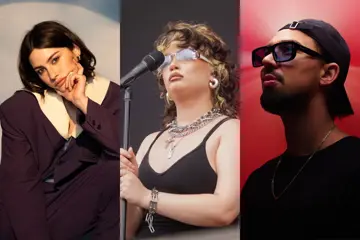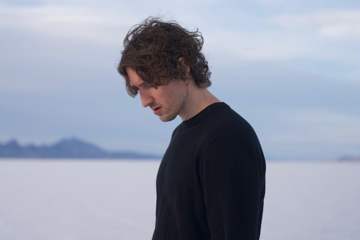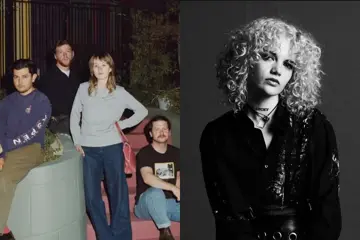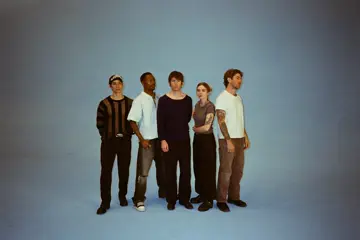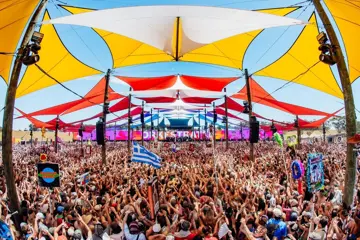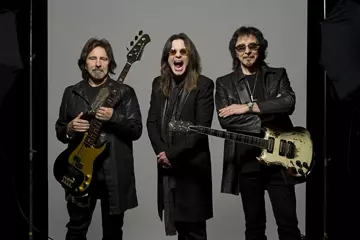When Brandon Welchez's voice washes down the phone line, he's on a bed between two cats: a bombay (“Helmut”), and a tabby (“Johnson”). It feels like a fitting image, somehow, as the backdrop for a discussion of the band and their latest offering, their fourth album in five years, Crimes Of Passion. Along with fellow bandmate Charles Rowell, Walchez seems to musically and personally exude a simultaneous sense of casualness and hard work, and of course lashings of effortless cool, but with a sense he wouldn't particularly like to be labelled that way. It's hard not to though – the band's 2009 bedroom-recorded debut Summer Of Hate, released following some high-profile love by No Age; 2010's Sleep Forever recorded in the Mojave desert by James Ford; and 2011's Berlin creation Endless Flowers, are all embodiments of cool, and recording Crimes of Passion in one week with the help of The Raveonettes' Sune Rose Wagner seals the appellation.
For Welchez though, it's just how things panned out. “We supported The Ravonettes on tour in 2009 so we were already friends with them. We hit it off on that tour. And we discussed working together back that far but it didn't really pan out. He [Wagner] lived in New York at the time so I would hang out with him here and, you know, I really trusted that he knew where we were coming from. So when the time came, luckily there was a week window there where we were available and he was available. So we just flew out to LA, Charles and I, and spent a week just in his bedroom in his house in LA.”
The limitations of recording an album in a week, and in a bedroom – not unheard of but certainly not the easiest undertaking – provided the duo with the compressed time they've become accustomed to, with both band members living on opposite sides of the globe: Welchez in New York and Rowell in London. “We didn't have time to fuck around,” Welchez explains. “It was in his [Wagner's] house so we didn't really have loads of gear to experiment with and we also didn't really have time to. We knew we had to go into it with a pretty clear concept of what we wanted the finished product to sound like, you know? I mean there were some snap decisions made but we had demoed everything. Before we met up Sune had chopped them up and showed us his ideas. So it had all been pretty clearly examined and discussed. And yeah it was just pretty easy, pretty fast. The easiest recording we've ever done, for sure.”
The product is an album which takes Crocodiles' evolution another step further from the crunch, fuzz and noise of their first outputs to an aurally sunnier, brighter place, where there's even room for a bit of spoken-word and some unadulterated piano on opening track I Like It In The Dark, sounds hinted at in Endless Flwoers' My Surfing Lucifer but brought out even prouder this time round. Almost obliterated is the punk aesthetic that drew the two together, after the winding up of their former bands Some Girls and The Plot To Blow Up The Eiffel Tower. With titles like Gimme Some Annihilation the duality of 'violence and beauty' Welchez has spoken about in the past is definitely present, but when he's singing “I want nothing more than to be your Marquis de Sade” there are plenty of oohs and ahhs to sweeten the suggestion. It's a beautiful tension that runs through the album, and Welchez counts it as the thematic glue of Crimes Of Passion. “I think we tend to stick to the subjects of love/hate a lot – one or the other. Every once in a while there's a social comment made, every once in a while there's something else expressed, but most of the time they're love or hate songs.”
Don't miss a beat with our FREE daily newsletter
Between Welchez and Rowell though, it's all love. After leaving San Diego Welchez went to New York and Rowell ended up in London, changing the possibilities of how the two would work together as the project continued post-San Diego life. “When we were living in the same city we could just go over to the other's house with like the tiniest idea and work on it together, whereas you're not going to just email somebody some piece-of-shit riff if you think it might possibly be something. So individually we go over our ideas a little bit more than we did when we lived in the same city, but I mean, we still really only work things up from a very skeleton point during our two week writing excursions that we have... And you know, once in a while we'll collaborate on something from the ground up when we're on tour or something, but we're usually too hung over to get anything done!” Welchez laughs.
“We're separated by an ocean,” Welchez puts it with pathos, but explains it hasn't stopped the two, who have been playing together since teenage-hood, continuing the work and friendship ties as strongly as ever. “I mean I typically see Charles when we have band business to do, so I see him for every tour and for a week or so before, and then you know, he'll come out here, or I'll go to London for two weeks. We'll do that maybe twice a year to work on demos and stuff but we communicate every day by text or email; we still have an active friendship, it's not just like music production together, I talk to him every day. But yeah, I don't see him that often unfortunately...” Welchez laments. “But you know, absence makes the heart grow fonder, we make up for it in person, you know?” If making up for it in person includes putting out albums like the latest, then yes, we know.


